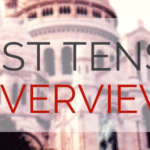
There are few grammar topics in learning French that English speakers struggle with more than the French subjunctive tense (or mood).
At its most basic, the subjunctive (le subjonctif) means that you’re implying some sort of duty or doubt or emotions or preferences on what “should” be done. In other words, you’re saying something that’s not a 100% solid fact or reality.
Most of the time when you use the present tense in French, you’re using the indicative mood, to the point where most textbooks don’t even bother mentioning that there are other “types” of the present tense. But there are, and one of them is the subjunctive.
Understanding the French Subjunctive Versus the English Subjunctive
So why can the French subjunctive be challenging? It’s mostly because you’ll have to remember to make a distinction in French when English rarely makes the distinction.
Examples of the French subjunctive mood in English
Let’s start with the handful of circumstances where the subjunctive occurs in English statements. You probably use it without ever thinking about what you’re saying.
For example, you might talk about impossibilities or desires like this:
“I wish I were smarter.”
“If she were a more organized person, she could have found her book in time for class.”
And commands or descriptions of duties like this:
“It is important that you be there on time.”
“I recommended that he try to be more understanding.”
“The professor requested that he speak up more in class.”
Those aren’t the normal conjugations of those verbs in English, yet you know to use them in certain sentence structures.
You will gain that intuitive level of when to use the subjunctive in French, too, with enough practice.
Tense or Mood?
We treat learning the present subjunctive just like learning the present indicative tense, but the subjunctive is technically a “mood” because its purpose is not to convey past, present, or future (these are the verb tenses). Instead, it’s a complete alternative to the present indicative (as are the conditional mood and the imperative mood). There are also past subjunctive tenses that we cover in another lesson.
How to conjugate the French subjunctive mood
Subjunctive conjugations are thankfully fairly regular. However, there are a few “stems” that are different from regular conjugations, but once you have the stems down, they still usually follow regular patterns. Major exceptions are, as with most verb conjugations, être and avoir.
Subjunctive conjugations of Regular verbs
First, for verbs that are regular in the subjunctive, you’ll 1) drop the -ent ending from the ils form of the indicative present tense verb, and 2) add on:
| je verb stem + e | nous verb stem + ions |
| tu verb stem + es | vous verb stem + iez |
| il/elle verb stem + e | ils/elles verb stem + ent |
Note that this pattern holds regardless of whether this is an -er, -re, or -ir verb.
For example, with grandir (“to grow up”), which has the third person present indicative conjugation grandissent:
| Grandir | |
| je grandisse | nous grandissions |
| tu grandisses | vous grandissiez |
| il grandisse | ils grandissent |
Notice that the normal French subjunctive ending pattern is similar to the conditional verb endings, except the third person plural ending is just -ent, not –aient. This pattern will make the present subjunctive in the third person plural look identical to the present indicative in the third person plural.
Irregular French Subjunctive Verbs with One Verb Stem
Many common verbs have irregular stems in the subjunctive, but otherwise follow the exact same verb endings pattern as above. Below, we show the je and nous conjugations to indicate that that the pattern holds true across all subject pronouns for that verb.
| Infinitive Verb | Subjunctive Form |
| faire | je fasse / nous fassions |
| savoir | je sache / nous sachions |
| pouvoir | je puisse / nous puissions |
Irregular French Subjunctive Verbs with Two Verb Stems
Another set of common French verbs uses one verb stem for the “boot”, (je/tu/il/ils) and another stem for the nous/vous conjugations. As with the examples above, the subjunctive verb endings remain the same.
| Infinitive Verb | Subjunctive: Je | Subjunctive: Nous |
| boire | je boive | nous buvions |
| prendre | je prenne | nous prenions |
| venir | je vienne | nous venions |
| aller | j’aille | nous allions |
| vouloir | je veuille | nous voulions |
Completely Irregular French Subjunctive Verbs
Finally, the conjugations for être and avoir you’ll just have to memorize. Luckily, they’re pretty simple, and you can probably see the logic in the verb endings used, even if they aren’t regular.
| Être | |
| je sois | nous soyons |
| tu sois | vous soyez |
| il soit | ils soient |
| Avoir | |
| j’aie | nous ayons |
| tu aies | vous ayez |
| il ait | ils aient |
Subjunctive “trigger” phrases
The list below are divided by “type” of subjunctive phrases, the certain expressions that “trigger” the subjunctive tense. Some of the most common phrases are listed below. Memorize what you can, but definitely at least read them all to get a feel for what types of phrases should prompt the subjunctive.
Notice that all the phrases and verbs listed below end with que. If there’s no que in a phrase, there’s about a 99% certainty the verb mood that follows shouldn’t be subjunctive.
Subjunctive Trigger: Duty
| il faut que… | it is necessary that… |
| exiger que… | to demand that… |
| ordonner que… | to order that… |
| commander que… | to order that… |
| il est essentiel que… | it is essential that… |
| il est important que… | it is important that… |
| il est naturel que… | it is natural that… |
| il est nécessaire que… | it is necessary that… |
| il est normal que… | it is normal that… |
| il est temps que… | it is time that… |
| il est urgent que… | it is urgent that |
Subjunctive Trigger: Preferences
| aimer mieux que… | to like better / to prefer that… |
| désirer que… | to desire that… |
| souhaiter que… | to wish that… |
| tenir à ce que… | to insist that… |
| vouloir que… | to want that… |
Subjunctive Trigger: Emotions
| avoir honte que… | to be ashamed that… |
| avoir peur que… | to be afraid that… |
| craindre que… | to fear that… |
| détester que… | to hate that… |
| de crainte que… | for fear that… |
| être content que… | to be happy that… |
| être désolé que… | to be sorry that… |
| être heureux que… | to be happy that… |
| être surpris que… | to be surprised that… |
| être triste que… | to be sad that… |
| il est bon que… | it is good that… |
| il est dommage que… | it is too bad that… |
| il est étrange que… | it is strange that… |
| il est heureux que… | it is fortunate that… |
| il est rare que… | it is rare that… |
| il est regrettable que… | it is regrettable that… |
| il est surprenant que… | it is surprising that… |
| il est utile que… | it is useful that… |
| redouter que… | to dread that… |
| regretter que… | to regret that… |
Subjunctive Trigger: Doubt/Uncertainty
| il est à souhaiter que… | it is to be hoped that… |
| il est impossible que… | it is impossible that… |
| il est improbable que… | it is improbable that… |
| il n’est pas clair que… | it is not clear that… |
| il n’est pas évident que… | it is not obvious that… |
| il n’est pas probable que… | it is improbable that… |
| il n’est pas sûr que… | it is not certain that… |
| il n’est pas vrai que… | it is not true that… |
| il semble que… | it seems that… |
| il se peut que… | it may be that… |
| à condition que… | provided that… |
| à moins que… | unless… |
| à supposer que… | assuming that… |
| afin que… | so that… |
| avant que… | before… |
| bien que… | although… |
| de façon que… | so that, in order that, in such a way that… |
| de manière que… | so that… |
| de peur que… | for fear that… |
| en admettant que… | assuming that… |
| en attendant que… | while, until… |
| encore que… | even though… |
| jusqu’à ce que… | until… |
| où que… | wherever… |
| pour que… | so that… |
| pourvu que… | provided that… |
| quoique… | even though… |
| quoi que… | whatever, no matter what… |
| quel(le) que… | whatever… |
| qui que… | whoever… |
| sans que… | without… |
Subjunctive Trigger: Superlatives
| seul…que… | only [subject] that… |
| dernier…que… | last [subject] that… |
| premier…que… | first [subject] that… |
With experience, you will begin to understand the patterns and general types of structures that lead to the subjunctive mood, and make educated guesses about when to use the subjunctive, even if you aren’t 100% sure that the phrase is on this list.
In my experience, you’ll receive a lot of grace from native French speakers if you use the subjunctive incorrectly. In most cases, they’ll understand what you meant. Some people will correct you and some won’t, but whenever they do, be grateful, because you probably won’t get that phrase incorrect again.
Next Steps
If you’re ready for a more advanced lesson, check out how to use the past subjunctive. Or you can work on the conditional mood to improve your grasp of its verb endings, which will be useful to understanding how the subjunctive is conjugated.




[Reference to previous typo]. Just thought i would point it out, nice post..thank you.
Thank you so much for pointing this out! I just corrected it. I’m glad you enjoyed the post.